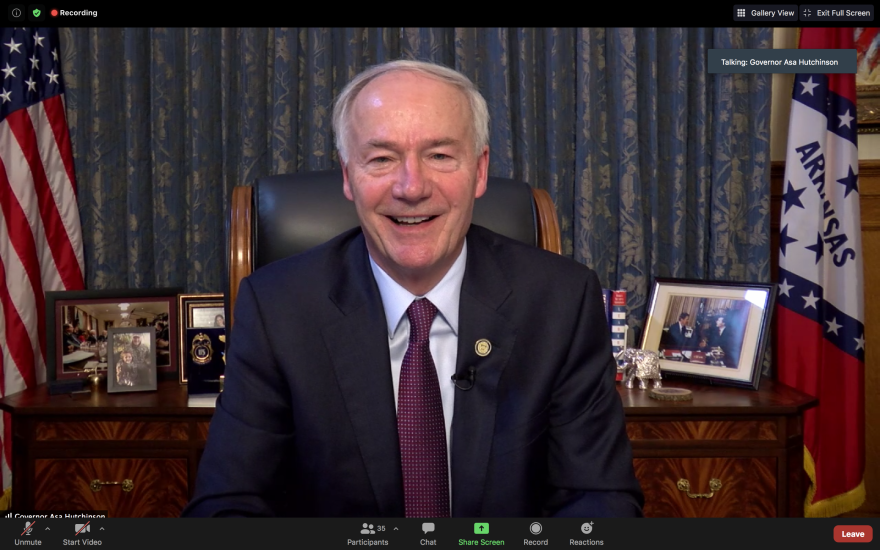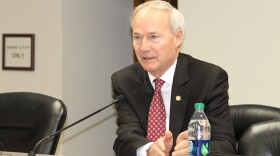Ahead of his final session as the head of Arkansas’ executive branch, Gov. Asa Hutchinson says he believes his office is in a good position to achieve many of his goals for the legislature.
Speaking to reporters on Friday along with Arkansas House Speaker Matthew Shepherd, R-El Dorado, and incoming Senate President Pro Tempore Jimmy Hickey, R-Texarkana, Hutchinson brought up COVID-19 funding and vaccinations, income tax cuts and raising teacher pay as agenda items he expects would be considered by the legislature in the session set to begin on Monday.
When asked which initiatives he thought would be the easiest to pass in cooperation with Arkansas’ lawmakers, Hutchinson mentioned more funding for rural broadband support as well as moving $100 million in surplus funding to the state’s long-term reserve fund.
"That is a hallmark of success for any state that you can increase your rainy day funds, you can set aside money for future downturns. So that has broad support," Hutchinson said.
As far as what would be more difficult to accomplish, Hutchinson spoke on the proposed hate crimes legislation, which has already received some pushback from Republican lawmakers.
"That’s a challenge for us, but I’m always hopeful that with more understanding of it, more discussion of it, more dialogue, that we can get something that’s very good and sends a signal that we’re not going to tolerate that kind of violence in Arkansas that is based upon targeting someone based upon who they are," Hutchinson said.
Hutchinson was also asked about the recent riot against the U.S. Capitol by pro-Trump extremists. Calling the riot "chaotic" and saying Trump misled his supporters, Hutchinson said that, "yes, I want this administration to end." However, Hutchinson also said he did not see a value in an impeachment process, as the inauguration is in less than two weeks.
Shepherd and Hickey spoke about the numerous bills they anticipate working on in the coming months, including many about the coronavirus.
Since the pre-filing period to file bills began in November, lawmakers have already submitted legislation seeking to either scale back the governor's emergency powers or end the public health emergency set by Hutchinson
When asked about how much support those efforts would have in the legislature, Hickey said he believe there is support in the Senate to work with the governor on what changes could occur with that proposed legislation and that it’s important to have legislation that could give lawmakers more oversight
"Every time that somebody tries to discuss this bill that will be coming up. I said, the one thing that I want to see is that, over the years be it five years, twenty years, thirty years, we’re going to have this legislation in place. If we were to have a major catastrophe that happened, I do not want to limit that our government would be able to operate," Hickey said.
In addition to emergency powers, Shepherd said two other areas that he expects the pandemic to influence legislation would be with scope of practice bills and broadband access.
"I think that broadband has come to the forefront. We were able to, through the CARES Act we were able to apply additional moneys to the expansion of broadband in Arkansas. And we’ve taken some terrific steps forward there, but there is still much more to be done," Shepherd said.
Concerning scope of practice bills, Shepherd said one possibility of those would be making permanent what Hutchinson’s public health emergency has already modified, such as currently more relaxed laws concerning telemedicine.
As far as how session is going to run on a technical basis while adhering to COVID-19 guidelines, on Thursday, in a joint news release with the Secretary of State, the legislature established its new coronavirus policies, which includes a mask mandate at all times, with few exceptions.
Additionally, procedures are also in place for committee rooms, which are smaller and can become crowded during session. According to the news release, committee agendas will be published at least 18 hours prior to a committee meeting.
Those who wish to speak on certain bills that are not currently being discussed by a committee will be placed in a public comment “holding room,” with limited capacity and “social-distanced” seating.
Members of the public will be required to wait in their designated room until the bill they wish to talk about is brought up. Live streams of the committees will be available in said holding rooms.
In addition to limiting seating in the committee rooms, seating will also be reduced in both legislative chambers, with limited public seating.






